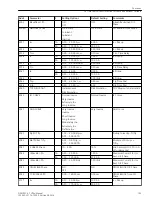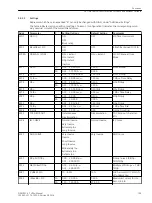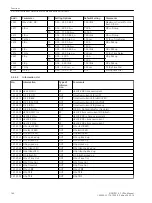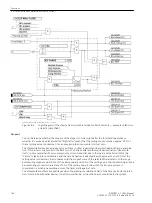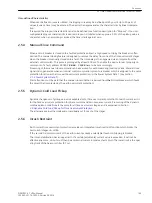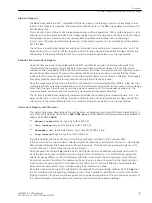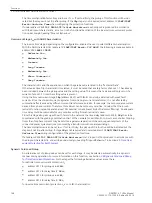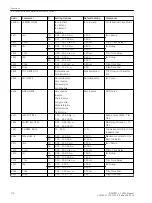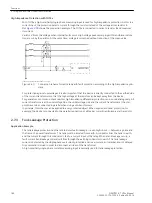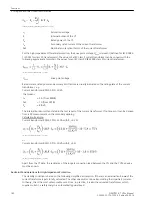
High-set Stage
Ι
E
>>
The
IE>>
stage (address 2411), combined with the
Ι
E> stage or the
Ι
Ep stage, results in a two-stage charac-
teristic. If this stage is not required, the pickup value shall be set to ∞. The
IE>>
stage always operates with a
defined delay time.
This current and time setting shall exclude pickup during switching operations. With a certain degree, current
grading can also be achieved similar to the corresponding stages of the time overcurrent protection for phase
and residual currents. However, zero sequence system quantities must be taken into consideration.
In most cases this stage operates instantaneously. A time delay, however, can be achieved by setting address
2412
T IE>>
.
The set time is an additional delay time and does not include the operating time (measuring time, etc.). The
delay can be set to ∞. If set to infinity, the pickup of this function will be indicated but the stage will not trip
after pickup. If the pickup threshold is set to ∞, neither a pickup annunciation nor a trip is generated.
Definite Time Overcurrent Stage
Ι
E
>
Using the time overcurrent stage
IE>
(address 2413), earth faults can also be detected with weak fault
currents. Since the starpoint current originates from one single current transformer, it is not affected by
summation effects evoked by different current transformer errors like, for example, the zero sequence current
derived from phase currents. Therefore, this address can be set to very sensitive. Consider that the inrush
restraint function cannot operate below 10 % nominal current (lower limit of harmonic filtering). An adequate
time delay could be reasonable for very sensitive setting if inrush restraint is used.
Since this stage also picks up with earth faults in the network, the time delay (address 2414
T IE>
) has to be
coordinated with the grading coordination chart of the network for earth faults. In most cases, shorter tripping
times than for phase currents may be set since a galvanic separation of the zero sequence systems of the
connected power system sections is ensured by a transformer with separate windings.
The set time is an additional delay time and does not include the operating time (measuring time, etc.). The
delay can be set to ∞. If set to infinity, the pickup of this function will be indicated but the stage will not trip
after pickup. If the pickup threshold is set to ∞, neither a pickup annunciation nor a trip is generated.
Overcurrent Stage
Ι
Ep
with IEC curves
The inverse time stage, depending on the configuration, enables the user to select different characteristics. In
case of IEC characteristics (address 124
DMT/IDMT Earth
=
TOC IEC
) the following options are available at
address 2425
IEC CURVE
:
•
Normal Inverse
(inverse, Typ A nach IEC 60255-3),
•
Very Inverse
(very inverse, Typ B nach IEC 60255-3),
•
Extremely Inv.
(extremely inverse, Typ C nach IEC 60255-3), and
•
Long Inverse
(longtime, Typ B nach IEC 60255-3).
The characteristics and the equations on which they are based, are listed in the “Technical Data”.
If the inverse time trip characteristic is selected, it must be noted that a safety factor of about 1.1 has already
been included between the pickup value and the setting value. This means that a pickup will only occur if a
current of about 1.1 times of the setting value is present.
Using the overcurrent stage
IEp
(address 2421) earth faults can also be detected with weak fault currents.
Since the starpoint current originates from one single current transformer, it is not affected by summation
effects evoked by different current transformer errors like, for example, the zero sequence current derived
from phase currents. Therefore, this address can be set to very sensitive. Consider that the inrush restraint
function cannot operate below 10 % nominal current (lower limit of harmonic filtering). An adequate time
delay could be reasonable for very sensitive setting if inrush restraint is used.
Since this stage also picks up with earth faults in the network, the time multiplier (address 2422
T IEp
) has
to be coordinated with the grading coordination chart of the network for earth faults. In most cases, shorter
tripping times than for phase currents may be set since a galvanic separation of the zero sequence systems of
the connected power system sections is ensured by a transformer with separate windings.
Functions
2.5 Time Overcurrent Protection for Earth Current
SIPROTEC 4, 7UT6x, Manual
167
C53000-G1176-C230-5, Edition 09.2016
Summary of Contents for SIPROTEC 4 7UT6 Series
Page 394: ...394 SIPROTEC 4 7UT6x Manual C53000 G1176 C230 5 Edition 09 2016 ...
Page 482: ...482 SIPROTEC 4 7UT6x Manual C53000 G1176 C230 5 Edition 09 2016 ...
Page 504: ...504 SIPROTEC 4 7UT6x Manual C53000 G1176 C230 5 Edition 09 2016 ...
Page 522: ...522 SIPROTEC 4 7UT6x Manual C53000 G1176 C230 5 Edition 09 2016 ...
Page 528: ...528 SIPROTEC 4 7UT6x Manual C53000 G1176 C230 5 Edition 09 2016 ...
Page 538: ...538 SIPROTEC 4 7UT6x Manual C53000 G1176 C230 5 Edition 09 2016 ...
Page 664: ...664 SIPROTEC 4 7UT6x Manual C53000 G1176 C230 5 Edition 09 2016 ...
Page 666: ...666 SIPROTEC 4 7UT6x Manual C53000 G1176 C230 5 Edition 09 2016 ...
Page 684: ...684 SIPROTEC 4 7UT6x Manual C53000 G1176 C230 5 Edition 09 2016 ...

